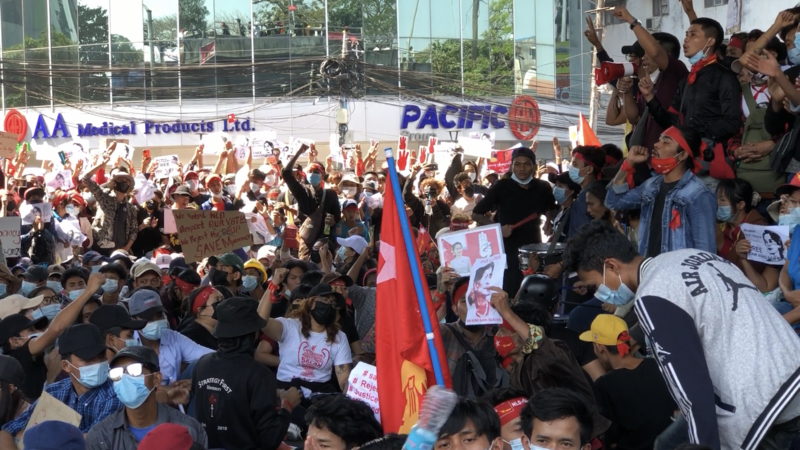The Myanmar junta pressed charges on a Japanese journalist it detained over filming protests that occurred in the country. The junta charged the journalist with encouraging dissent against its military.
The Myanmar junta issued a statement this week announcing that it has charged Japanese journalist Toru Kubota with encouraging dissent against the military. The junta also charged Kubota with breaching immigration law.
This comes as the junta has sought to crack down on dissent among the citizens and press freedoms since the generals seized power in a coup in February last year. Hundreds were killed in the crackdown, and thousands were detained.
Myanmar laws carry a maximum three-year prison term for encouraging dissent against the military, and a maximum five-year prison term for breaching immigration laws.
Kubota was arrested near an anti-coup protest in Yangon along with two other Myanmar citizens. Kubota was transferred to Insein Prison in Yangon following the charges that were filed against him, according to AFP, citing a security source.
Kubota is also the fifth journalist that the junta has arrested following the arrests of US nationals Nathan Maung and Danny Fenster, Polish national Robert Bociaga, and Japanese national Yuki Kitazumi – all of whom were freed and deported.
“The regime has declared war on journalists, and 505 (a) is its preferred charge,” said International Crisis Group’s Richard Horsey, according to AFP. “This charge against a Japanese journalist shows the regime is determined to continue stifling objective reporting, whether by local or foreign journalists.”
The Japanese foreign ministry said that its embassy in Myanmar was looking to appeal to the authorities for the release of Kubota.
ASEAN chair, Cambodian Prime Minister Hun Sen said Wednesday that the bloc may be forced to rethink its peace plan if the junta continues executions, following the execution of four activists by the junta last month, drawing international condemnation.
“If more prisoners are executed, we will be forced to rethink…our role vis a vis ASEAN’s five-point consensus,” said Hun Sen in his opening remarks at the meeting with the bloc’s foreign ministers.
Hun Sen said the bloc’s unity was challenged by the crisis in Myanmar, and as the peace plan has led to little progress from the junta, there was progress on providing the country with humanitarian aid.



 TrumpRx.gov Highlights GLP-1 Drug Discounts but Offers Limited Savings for Most Americans
TrumpRx.gov Highlights GLP-1 Drug Discounts but Offers Limited Savings for Most Americans  Trump Allegedly Sought Airport, Penn Station Renaming in Exchange for Hudson River Tunnel Funding
Trump Allegedly Sought Airport, Penn Station Renaming in Exchange for Hudson River Tunnel Funding  Trump Lifts 25% Tariff on Indian Goods in Strategic U.S.–India Trade and Energy Deal
Trump Lifts 25% Tariff on Indian Goods in Strategic U.S.–India Trade and Energy Deal  Marco Rubio Steps Down as Acting U.S. Archivist Amid Federal Law Limits
Marco Rubio Steps Down as Acting U.S. Archivist Amid Federal Law Limits  China Warns US Arms Sales to Taiwan Could Disrupt Trump’s Planned Visit
China Warns US Arms Sales to Taiwan Could Disrupt Trump’s Planned Visit  Trump Rejects Putin’s New START Extension Offer, Raising Fears of a New Nuclear Arms Race
Trump Rejects Putin’s New START Extension Offer, Raising Fears of a New Nuclear Arms Race  U.S. Sanctions on Russia Could Expand as Ukraine Peace Talks Continue, Says Treasury Secretary Bessent
U.S. Sanctions on Russia Could Expand as Ukraine Peace Talks Continue, Says Treasury Secretary Bessent  South Korea Assures U.S. on Trade Deal Commitments Amid Tariff Concerns
South Korea Assures U.S. on Trade Deal Commitments Amid Tariff Concerns  Newly Released DOJ Epstein Files Expose High-Profile Connections Across Politics and Business
Newly Released DOJ Epstein Files Expose High-Profile Connections Across Politics and Business  U.S. Announces Additional $6 Million in Humanitarian Aid to Cuba Amid Oil Sanctions and Fuel Shortages
U.S. Announces Additional $6 Million in Humanitarian Aid to Cuba Amid Oil Sanctions and Fuel Shortages  NATO to Discuss Strengthening Greenland Security Amid Arctic Tensions
NATO to Discuss Strengthening Greenland Security Amid Arctic Tensions  Missouri Judge Dismisses Lawsuit Challenging Starbucks’ Diversity and Inclusion Policies
Missouri Judge Dismisses Lawsuit Challenging Starbucks’ Diversity and Inclusion Policies  Nighttime Shelling Causes Serious Damage in Russia’s Belgorod Region Near Ukraine Border
Nighttime Shelling Causes Serious Damage in Russia’s Belgorod Region Near Ukraine Border  Trump Signs “America First Arms Transfer Strategy” to Prioritize U.S. Weapons Sales
Trump Signs “America First Arms Transfer Strategy” to Prioritize U.S. Weapons Sales  Trump Endorses Japan’s Sanae Takaichi Ahead of Crucial Election Amid Market and China Tensions
Trump Endorses Japan’s Sanae Takaichi Ahead of Crucial Election Amid Market and China Tensions  UAE Plans Temporary Housing Complex for Displaced Palestinians in Southern Gaza
UAE Plans Temporary Housing Complex for Displaced Palestinians in Southern Gaza  Trump Signs Executive Order Threatening 25% Tariffs on Countries Trading With Iran
Trump Signs Executive Order Threatening 25% Tariffs on Countries Trading With Iran 































